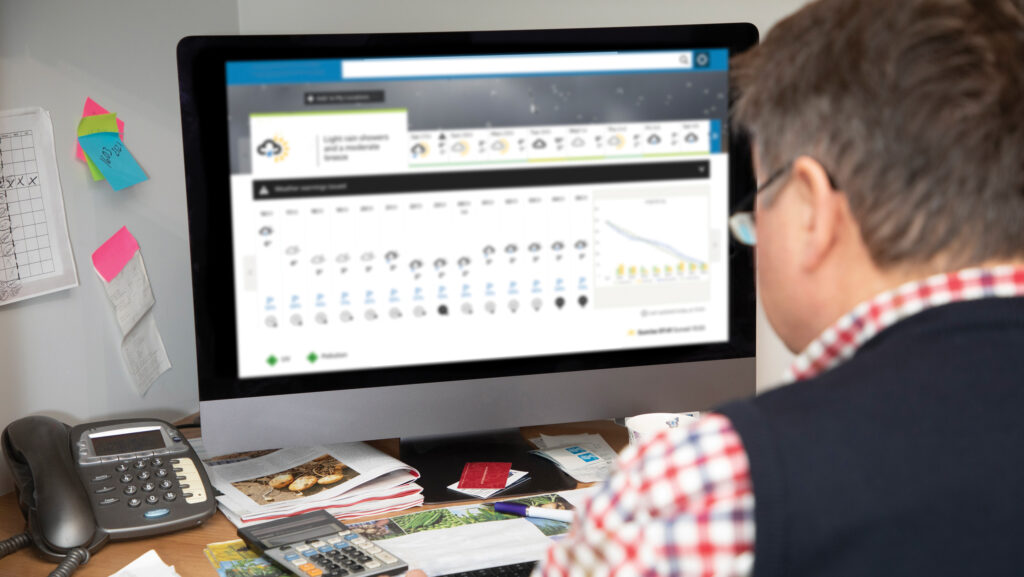What the Institute of Agricultural Management offers farm managers
 Computer in farm office
Computer in farm office Changing agricultural and environmental policies along with a shift in public expectations mean that farmers and their managers have an increasingly challenging job.
Many of those described as farm managers have a far wider role, often extending to estate manager, taking in property responsibilities and diversified business enterprises.
The management of capital intensive and asset rich businesses demands a professional approach which the Institute of Agricultural Management (IAgrM) promotes and develops.
It has a strong regional structure, with 20 branches across Great Britain.
In-person meetings and farm walks resumed after lockdown, but during the Covid restrictions, the institute introduced 60-minute sessions to keep members updated and to continue training.
See also: Survey of farm managers’ pay shows 12% rise in two years
These still run from March to October and include continuous professional development sessions on subjects ranging from health and safety management to updates on the latest government schemes from a wide range of experts.
Institute of Agricultural Management
- Workshops and farm visits
- Training and continuous professional development, in person and online, also leadership courses
- Provides information on management and ancillary courses in agriculture and associated industries
- National farm management conference, annually in November
- Encourages local discussion and contact through a network of branches
- Active forums
- Provides mentors to young and other managers
- Co-operates with other organisations and/or sectors of the economy to enhance farm management in general
- Licensed to award Chartered Environmentalist status
- Members include farm managers, farm management consultants, supply trade personnel, those in farming education
- Farm manager pay and benefits survey every two years
- Seven membership grades – member, commended member, professional member, fellow, graduate and retired. Annual subscriptions range from £60 to £135. Student membership is free.
Recently appointed IAgrM chairman Richard Price runs Ewematter, a farm management consultancy providing advice combining technology with sustainable objectives to address financial and environmental targets. Mentoring farm and estate managers is part of this business, which he runs with his wife Clare, as are succession planning and recruitment.
“Recruitment and machinery overheads are two of the biggest challenges for farming businesses,” says Richard, who is the independent judge of the 2024 Farmers Weekly Farm Manager of the Year Award.
“Staff are so important and recruitment is so difficult. It’s so important to attract good candidates both from within and outside the sector.”
He believes IAgrM membership offers a way to differentiate in the job market and points out that the most recent salary and benefits survey showed that IAgrM members earned almost £9,000 more than non-members.
“As well as developing their staff, really good managers also remember to develop themselves,” says Richard, who began his career in farm management at Warwickshire College before moving to Lowther Estate for nine years, where he was farm manager before being appointed director of farming.
On leaving Lowther he spent a short spell in Dorset before becoming estate manager at the Tetworth Estate in Bedfordshire for six years.
As well as professional development, institute membership offers an amazing network of people, he says. “It has helped me get out of my bubble, to share experiences and pick up new ideas.”
He plans to use his time as chairman to help the next generation of managers. “I believe the Institute can also help those from non-farming backgrounds to develop within our industry.
IAgrM membership has more than doubled in the past five years, to a total of 1,087 members. Of these, 254 are professional members and 316 are student or graduate members, with a good increase of female members taking leading roles within agricultural management as well as agricultural consultancy, says IAgrM director Victoria Bywater.
The rate for the job
The latest IAgrM survey shows 59% of managers are paid between £40,000 and £70,000 for responsibilities ranging from solely managing day-to-day activities on a farm, through staff recruitment, capital investment and wider estate management.
According to the research, the average salary of £59,695 is made up of a gross salary of £54,753 and £4,941 in profit shares and bonuses.
